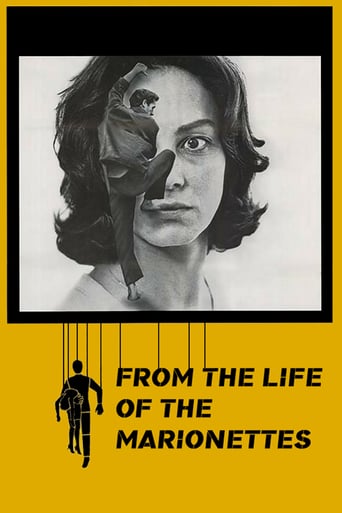



Fantastic!
An Exercise In Nonsense
It’s an especially fun movie from a director and cast who are clearly having a good time allowing themselves to let loose.
View MoreThis movie was so-so. It had it's moments, but wasn't the greatest.
View MoreDespite having seen the best part of Höstsonaten, Bergman's film immediately prior to Aus dem Leben der Marionetten, I never completed the viewing experience. Thus, this ranks itself as my very first Bergman, something I'd been rather looking forward to for quite some time.Beginning with a surprising scene in which a well dressed man strangles a prostitute, Aus dem Leben der Marionetten follows this event up by examining the events before and after it, hopping through a time frame of two to three months. Through the conversations which precede and follow this catastrophe—as the film's intertitles elect to label it—we learn gradually more about the reasons and the people behind it.I have a very deep proclivity toward non-English films playing late at night on television, particularly those in German—simply because I'm a student thereof. In the fleeting moments between realising such a film directed by the acclaimed Bergman—of whom I regrettably knew rather little—was about to grace my screen and its beginning, I was somewhat disenchanted to learn that this is not considered amongst his greatest. Nevertheless, I happily sat back to watch the potential magic unfold. The opening scene of murder is a strange one, the severity of the violence neither understood by its recipient or indeed by us; verily, it is suggested that not even the assailant understands what he is doing. Thereafter, an intriguing thing happens: the colour drains from the film, turning the previous rich reds to a dull monochrome. This effect is fascinating, inviting us to ruminate upon its purpose more than beginning in black and white would have done. The film follows this up with a non-chronological narrative progression, ducking from past to future—considering the murder the present, of course. Most of these scenes take the form of intimate conversations or extended monological musings, discussing in a vague manner many aspects of life. These are beautifully shot, a scene in which a homosexual man addressing the killer's wife slowly comes to regard himself in the mirror completely entrancing and surprisingly tender. Noteworthy too are the dream sequences—most rife in the film's middle section—dazzlingly bright and beautifully narrated. These exhibit a visual flair as inherently important to an understanding of the film as any dialogue. The film is both visually and thematically interesting, examining through both the factors that drive ordinary people to brutal actions. Somewhat of a recondite piece, it is the kind of film that lingers with you, returning to your mind a number of times after viewing. The performances, particularly that of Martin Benrath—in the role of the aforementioned gentleman—are nothing short of arresting.Containing a cornucopia of pleasing visuals and highly effective metaphors—the importance of mirrors springs to mind—Aus dem Leben der Marionetten is a voluptuous treatise on life and love; repression and expression; individuality and relationships. Slow moving, but completely involving, if this is a lesser Bergman, I can't wait to see how he could improve upon it.
View MoreIngmar Bergman's cold, clinical case study explores the psycho-sexual inhibitions of a Swedish man unable to trust his wife but unwilling to leave her, leading him finally to murder and then rape a young prostitute. The verbally explicit drama is challenging and controversial but also impersonal and uninvolving, in large part because of Bergman's deliberately detached viewpoint and the unfortunate addition (on the old VHS print I saw, at least) of substandard English overdubbing. The implied criticism of Freudian analysis is worth noting (if only because it's more interesting than the facts in the case itself), but the film hardly qualifies as entertainment, except perhaps for highbrow viewers needing strong food for thought.
View MoreIngmar Bergman's From the Life of the Marionettes, his last film done while in exile during the late 70's, hearkens back to his experimental period in the mid to late 60's. Here he's trying for a deconstructive way to get inside the mind of his subjects, most notably the character of Peter Egermann. The fatal flaw of the film, however, is also something that adds an unusual kind of connection to the material for a Bergman film. It's erratic in its narrative as the director tests himself with jumping around from different times around a single event. But unlike how this has been done by the likes of Tarantino, this is meant not really as a useful story trick, but to try to get different perspectives and acute angles of the subject at hand. The film doesn't reach its greatness for the same reason that it does keep itself watchable- this is very murky, depressing times, loaded with dialog that may or may not go ways to help explain or give some interest in the supporting/main characters, and some startling, if dated, surreal experiences.It's also a little strange that Bergman decided to connect these characters, however loosely, to the couple in the first episode of the Scenes From a Marriage series, where Peter and Katarina (then played by Jan Maljsmo and Bibi Andersson) were the volatile arguers who juxtaposed the main focus of the film. Here, portrayed by Robert Atzorn and Christine Buchegger, are not only not as spot-on as the former actors (though they are still quite good and splendid in some scenes), the couple is picked under Bergman's psychological microscope where the relationship is very strained and a fatalistic. The opening scene is definitely a mind-blower, with an intensity and harsh sexual edge that is uncommon to Bergman's films (one of his best openings to be sure). Indeed, one of the nice twists, a little shocking at first and then intriguing, is how the filmmaker lets out inhibitions and shows the more explicit images of nudity and the sensual, as well as rock and disco music.Along with a fragmented approach to the storytelling, where infidelities, insecurities, shame, depression, and outright rage and confusion are brought out in segments that range from the convincing to missing the mark. In a way, maybe Bergman's aims are lowered this time in exile, and he delves more into a doomed personality with visual surprise. Sven Nyvkist, as usual, is still very good with what he does in the frame, especially as this is 90% black and white (with a strange blue tint at times), and his services come into great use in a visual detailing of a dream involving Peter and Katarina naked in a wide, white space. It's maybe the best sequence in the film. In experimenting with the dramatic interpretations, it's not as successful, and some of the supporting actors aren't as good as the leads (a scene with one of the actors talking into a mirror is one of my least favorite scenes Bergman's ever wrote/directed). Its obscurity is not, therefore, that staggering to see. But it is a good and occasionally spine-tingling character study, and if you are into the filmmaker's work already it's a find that might prove better or more fulfilling. 7.5/10
View MoreThe story begins in colors with the violent murder of a prostitute followed by necrophilism by Peter Egermann (Robert Atzorn). Through the investigation, in black & white, the investigator interviews Peter's wife, the beautiful designer Katarina Egermann (Christine Buchegger), his doctor, his mother and some friends, and realizes that Peter is an unsecured man, who has never controlled his own life. His doctor's report indicates that Peter had a breakdown. In the colored epilog, Peter is in his cell, in a mental institution, observed by his wife and his nurse. This dark and disturbing psychological movie is very depressive. I am a fan of Ingmar Bergman, the interpretations and direction are excellent, as usual, but I did not like this complex story. My vote is seven.Title (Brazil): `Da Vida das Marionetes ` (`From the Life of the Marionettes')
View More